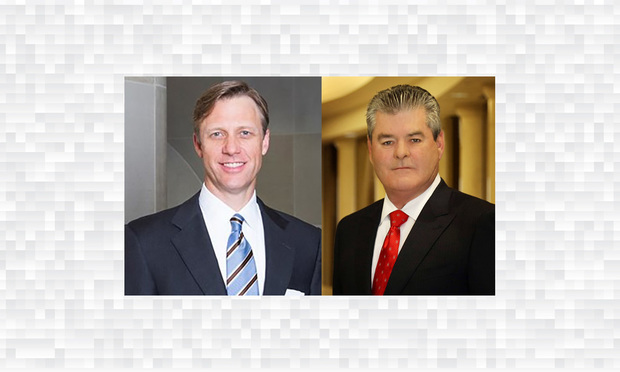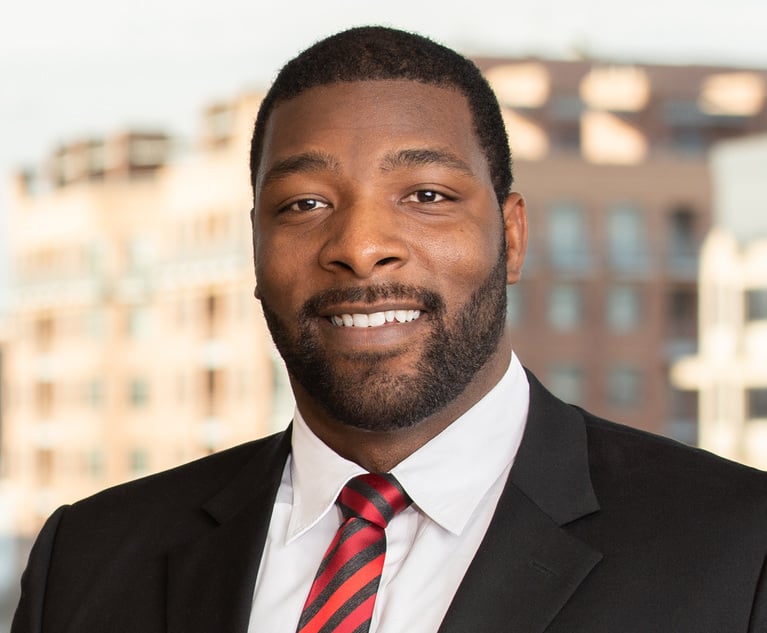Litigators of the Week: Houston Lawyers Convince Advertising Consultant To Drop Claim Against Law Firm
When Houston mass tort lawyer Clayton Clark was sued over an advertising contract dispute, he went looking for the best trial counsel he could find and choose two from either side of the bar to represent him: plaintiff lawyer Jim Perdue Jr. and defense attorney Alistair Dawson.
May 14, 2018 at 12:05 PM
5 minute read

When Houston mass tort lawyer Clayton Clark was sued over an advertising contract dispute, he went looking for the best trial counsel he could find and choose two from either side of the bar to represent him: plaintiffs lawyer Jim Perdue Jr. and defense attorney Alistair Dawson.
And that pair turned out to be a formidable combination because, when it came time to try the case on May 2 after three years of litigation, the plaintiff didn't bother to show up at the Harris County courthouse, sending his attorneys in his stead to nonsuit the case.
“It was a lot of fun to work with people that I respect and it was an honor to bring it to a head. It would have been a heck of a case to try,'' said Perdue, a partner in Houston's Perdue & Kidd who is a personal injury attorney.
Dawson also regretted that the case settled because he'd always wanted to try a case with Perdue, who he counts as a good friend.
“It's the first time we've worked together,” said Dawson, a partner in Houston's Beck Redden who defends businesses in commercial litigation. “We brought different skills to the table, and I was really disappointed we didn't get to trial because I really wanted to watch Jim and work with him.''
Their client, Clayton Clark and his law firm Clark, Love & Hutson, represent plaintiffs claiming injury from pharmaceutical drugs and devices. Clark and his firm spend substantial money running television advertisements for their legal services. They were sued in 2015 by Keith Cohn, an advertising and marketing consultant who claimed he had an oral contract with Clark—first charging him 15 percent of the advertising cost, which Cohn later reduced to a 12 percent commission.
Cohn claimed that Clark ultimately offered him another deal: if Cohn would reduce the up-front commission to 8 percent, Clark would pay him a bonus worth four times Cohn's normal fee when cases brought in through Cohn's advertising settled.
Cohn also contended that he had a deal to locate investors in Clark's advertising campaigns in exchange for 1 percent of any fees earned by Clark from clients obtained through the advertising campaigns.
But Perdue and Dawson convinced Tad Halbach, judge of Harris County's 333rd District Court, that the finder's fee arrangement that Cohn claimed he had with Clark was illegal because attorneys are not allowed to split their fees with non-lawyers—a ruling that survived an appeal to Houston's First Court of Appeal in 2016.
And Perdue and Dawson later submitted proposed findings of fact and conclusions of law that the changing deals Cohn supposedly had with Clark didn't make any business sense, and that the oral deal never happened.
“The plaintiff claims the oral contract was formed on Nov. 1, 2010, at Mr. Clark's office here in Houston. And what they didn't know was Mr. Clark wasn't in his office that day and wasn't even in Houston. So, our first position was there wasn't any agreement,” Dawson said.
“And the proposed agreement makes no sense,” Dawson said of the argument that Clark owed him $1.8 million in advertising bonuses.
“What he was saying was: 'I normally would charge you 12 percent commission. I agree to reduce it to 8 percent, and you agreed to give me a bonus of 48 percent when the cases settle.' If you do the math and spend, say, $100,000 on advertising, he would normally get $12,000 in commission. He agrees to cut it to $8,000, but in the end he's going to get $48,000?” Dawson said. “No sane, rational person would make that deal, and Mr. Clark did not make that deal.''
Cohn was ultimately paid $750,000 by Clark based on a flat fee, Perdue said.
“I think our proposed findings of fact and conclusions of law let them know they were in an impossible situation,” Perdue added.
Perdue noted that less than two weeks before the May 2 trial day, the plaintiff asked for a delay after realizing they had not made a jury demand in their case—a motion that was denied.
“We were pushing for a trial, and they kept throwing furniture in front of the freight train that just kept coming,'' Perdue said.
And on the May 2 trial date, Cohn's lawyers agreed to dismiss his case with prejudice in exchange for Clark dropping a declaratory judgment motion seeking the court to declare their deal never existed.
John Neese, an attorney with Houston's Meade & Neese who represents Cohn, did not return a call for comment.
“I'm pleased for my client and with the result,'' Dawson said. “I wanted to try the case, but they offered victory so you've got to take victory.''
This content has been archived. It is available through our partners, LexisNexis® and Bloomberg Law.
To view this content, please continue to their sites.
Not a Lexis Subscriber?
Subscribe Now
Not a Bloomberg Law Subscriber?
Subscribe Now
NOT FOR REPRINT
© 2025 ALM Global, LLC, All Rights Reserved. Request academic re-use from www.copyright.com. All other uses, submit a request to [email protected]. For more information visit Asset & Logo Licensing.
You Might Like
View All
State Bar Ethics Opinion Determines Texas Lawyers Can't Join a Firm With Non-Lawyer Partners
2 minute read

Jones Day Names New Practice Leaders for Antitrust, Business and Tort Litigation and Latin America

Trending Stories
- 1ACC CLO Survey Waves Warning Flags for Boards
- 2States Accuse Trump of Thwarting Court's Funding Restoration Order
- 3Microsoft Becomes Latest Tech Company to Face Claims of Stealing Marketing Commissions From Influencers
- 4Coral Gables Attorney Busted for Stalking Lawyer
- 5Trump's DOJ Delays Releasing Jan. 6 FBI Agents List Under Consent Order
Who Got The Work
J. Brugh Lower of Gibbons has entered an appearance for industrial equipment supplier Devco Corporation in a pending trademark infringement lawsuit. The suit, accusing the defendant of selling knock-off Graco products, was filed Dec. 18 in New Jersey District Court by Rivkin Radler on behalf of Graco Inc. and Graco Minnesota. The case, assigned to U.S. District Judge Zahid N. Quraishi, is 3:24-cv-11294, Graco Inc. et al v. Devco Corporation.
Who Got The Work
Rebecca Maller-Stein and Kent A. Yalowitz of Arnold & Porter Kaye Scholer have entered their appearances for Hanaco Venture Capital and its executives, Lior Prosor and David Frankel, in a pending securities lawsuit. The action, filed on Dec. 24 in New York Southern District Court by Zell, Aron & Co. on behalf of Goldeneye Advisors, accuses the defendants of negligently and fraudulently managing the plaintiff's $1 million investment. The case, assigned to U.S. District Judge Vernon S. Broderick, is 1:24-cv-09918, Goldeneye Advisors, LLC v. Hanaco Venture Capital, Ltd. et al.
Who Got The Work
Attorneys from A&O Shearman has stepped in as defense counsel for Toronto-Dominion Bank and other defendants in a pending securities class action. The suit, filed Dec. 11 in New York Southern District Court by Bleichmar Fonti & Auld, accuses the defendants of concealing the bank's 'pervasive' deficiencies in regards to its compliance with the Bank Secrecy Act and the quality of its anti-money laundering controls. The case, assigned to U.S. District Judge Arun Subramanian, is 1:24-cv-09445, Gonzalez v. The Toronto-Dominion Bank et al.
Who Got The Work
Crown Castle International, a Pennsylvania company providing shared communications infrastructure, has turned to Luke D. Wolf of Gordon Rees Scully Mansukhani to fend off a pending breach-of-contract lawsuit. The court action, filed Nov. 25 in Michigan Eastern District Court by Hooper Hathaway PC on behalf of The Town Residences LLC, accuses Crown Castle of failing to transfer approximately $30,000 in utility payments from T-Mobile in breach of a roof-top lease and assignment agreement. The case, assigned to U.S. District Judge Susan K. Declercq, is 2:24-cv-13131, The Town Residences LLC v. T-Mobile US, Inc. et al.
Who Got The Work
Wilfred P. Coronato and Daniel M. Schwartz of McCarter & English have stepped in as defense counsel to Electrolux Home Products Inc. in a pending product liability lawsuit. The court action, filed Nov. 26 in New York Eastern District Court by Poulos Lopiccolo PC and Nagel Rice LLP on behalf of David Stern, alleges that the defendant's refrigerators’ drawers and shelving repeatedly break and fall apart within months after purchase. The case, assigned to U.S. District Judge Joan M. Azrack, is 2:24-cv-08204, Stern v. Electrolux Home Products, Inc.
Featured Firms
Law Offices of Gary Martin Hays & Associates, P.C.
(470) 294-1674
Law Offices of Mark E. Salomone
(857) 444-6468
Smith & Hassler
(713) 739-1250






